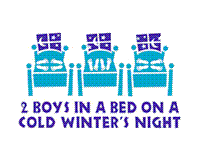In “Hamlet” William Shakespeare made the comment “the play’s the thing.” Unfortunately he did not expand on that thought as far as suggesting how theatre companies draw audiences to their venues to see the plays presented.
As a graphic designer I have had many opportunities over the past 30 years to assist performing arts organizations in the marketing and promotion of their efforts by creating logos for companies and theater spaces, identities for shows, posters, season ticket brochures, T-shirts and other marketing pieces. I remember creating a rough, stencil like image for a high school production of Thorton Wilder’s “Our Town” back in the mid-70’s, but I certainly had no premonitions that I would be doing a great deal of such work in the future. In college I designed posters, ads, T-shirts and other graphics for plays, concerts and other art-related associations and events. Later, while living in Seattle, I designed logos, programs, ads and promotion items for the performing arts groups Alice B. Theatre, the Seattle Men’s Chorus, the Evergreen Theater Conservatory and similar companies.

It was also in Seattle that I first became aware of the logo design work being done for local theater by Art Chantry (above). I’d met Chantry, the subject of the book Some People Can’t Surf: The Graphic Design of Art Chantry by Julie Lasky, while he was working at the alternative publication “The Rocket.” His logo creations for local theater companies and plays are what caught my attention the most. The work was stark - almost always just black and white – and had a simplicity that conveyed a great deal about the theatre production company or play being represented. The designs really inspired me to seek out opportunities doing logo design work for similar clients.
In early 1990 I attended the first play of a new Portland theatre company. I’ve got to admit, while looking over the program for the play, my first thought was “these guys could use some help.” Little did I know that I would meet the playwright/director/producer/ticker seller at a party a few weeks later. In that first conversation, Don Horn asked if I’d be interested in meeting with him to discuss some design projects for the theatre. For 16 years I worked with the theatre company, triangle productions!, located in Portland, Oregon. I designed over 100 logos for the company, its venues, shows that have been presented and special promotions. My work for the company has received nearly that number of design awards and many of the logos have been featured in numerous international design books. We have created programs, posters, signage, T-shirts, magnets, beverage cups, a paper doll book and many other unique (and fun) items in an effort to draw audiences to shows over the past decade and a half.

For myself, designing logos for live theatre companies offers me a chance to be at my most creative. With design projects for such a creative clientele there is often a great deal of room to stretch one’s creative muscles. This is not standard or conservative graphic design faire. In designing logos for theatrical productions a designer can often go over the top in the creation of attention-getting images. There is an incredible opportunity to play with type and color in unrestricted ways. I enjoy working with somewhat unusual color combinations and incorporating type from font houses such as P22, Fonthead Design, House Industries or Veer – type you many not normally see in more corporate or commercial designs. It’s not a question of “pushing the envelope” or working “out of the box” – there is no ‘envelope” or “box.” Within the theatrical graphic imagery a designer has the chance to convey the essence of a play, monologue or musical in a unique and stylized manner.
The subject matter lends itself to blatant graphic interpretations. My own experience has included being able to produce images for productions from Shakespeare to spoofs on the Bard. Topic matter has included AIDS, cannibalism, strippers, sex, country-western music, vaginas, religion, Internet dating, death, unique personal relationships, murder, concentration camps, drag queens, drug use and everything in between. Titles have included “Girls’ Night Out,” “2 Boys in a Bed on an Cold Winter’s Night,” “Dishin’ With Divine,” “The Food Chain,” “Naked Boys Singing” and so many more. (The play “Party!” is a personal favorite. Not only did I design the logo, T-shirts and a program – I actually got to spend the summer of my first mid-life crisis directing the show with seven naked men on stage – including Peter Paige who went on to “Queer as Folk” fame) How could a designer not be inspired to come up with some great logo designs to represent such topics and shows?

Don Horn, of triangle productions!, was an incredible client. Each of the past seasons he has provided me with the scripts of all the plays to be produced that year. After reading the plays, I had a meeting with Don to discuss a possible theme for the year as far as design style or colors to be used in printing the season ticket brochure, posters and programs. He then set me loose to be creative – and left me alone! The “leaving me alone” part was initially a foreign concept to me. Never before had I worked with a client who gave me free reign of the process. I never had Horn reject a logo I created for one of his shows. It was a very strange and wonderful client relationship over the years – and I truly value this particular client as a friend.

Judith Mayer, of Keyword Design, also appreciates the opportunity to collaborate with other creatives in a design relationship much different than most corporate clients.
“(Theatre clients) are sometimes more willing to go for a daring or whimsical design solution,” according to Mayer. “The fact that a show is a short term event gives them a little more freedom than if it were a logo that a business wants to last 20 years.”
Mayer enjoys the challenge of telling a story, or conveying a mood, through simple striking graphics. She designs for the Towle Community Theater, in Hammond, Indiana, which presents several shows each season that are not considered standards or classics. Mayer’s challenge is to make the public understand what kind of a show it is – even if they have never before heard the title. The examples below were all designed by Mayer for the Towle Community Theater:

“To create a logo that sums up the story means a lot of image editing - getting down to the strongest symbols or characters,” says Mayer. “In using only the key things that define the story, I try to say a lot using very little.”
As in many of my own theater design experiences, Mayer finds that when a season is promoted all at once the logos for four or five shows need to complement each other and at the same time show a range. She feels the logos must share similar characteristics in order to look like a complete set and must have differences to show whether it is a comedy, drama, classic or cutting edge theatre.
Mayer sits down with the director and has him tell her the story and asks him to list the important characters, props, locations, costume elements, scenery and songs if any.
“I may also ask him to define the look and feel of the production so that I have a pool of potential graphics to choose from,” Mayer adds. “Having him tell me the story takes into account the differences this production may have from another theater’s production of the same play.”
“Total creative freedom.”
That is what designer Jim Charlier, of JCharlier Communication Design, gets out working with those in the theatre arts. He created the series of logos below for the Niagara University Department of Theatre and Fine Arts’ current season of plays. The initial project was to create a 16-page season program booklet.

Charlier is fortunate to enough to have access to a wealth of imagery from The Castellani Art Museum of Niagara University for use in the season program. The permanent collection consists of contemporary prints, photographs, paintings, drawings and sculpture by artists such as Picasso, Basquiat, Modigliani, Dali, Motherwell, DeKooning, Nevelson, Rothenberg, Haring, Rauschenberg and many more.
“Because rights and permissions to use the artworks are either costly (for advertising purposes), or take time to acquire, I am the one that suggested creating a logo for each play, not only to individualize the play, but to also be practical for other advertising needs such as black and white print ads.” says Charlier.
“I created the series using one typeface (P22 Garamouche) to give them consistency for the season. Many of these logos were my first and only attempts. Nary a change was made by the client — they are smart, have good taste and are appreciative of professional-quality work,” Charlier remarks.
Charlier comments that such projects offer him the only total creative freedom he gets in designing logos - unless designing for himself which he finds can be much “tougher.” He finds that most clients add complexity to either the process or the final design in the creation of logos.
“Designers always want to simplify,” Charlier adds. “Working on the theatre projects is a breath of fresh air and I get to make them as simple as I want them to be.”
In Charlier’s situation many productions are already known commodities, such as Chicago and Gypsy. He doesn’t find there is much “heavy lifting” to get the gist of the play across to the potential audience. His logos take graphic cues directly from the storyline or theme of the play - whether comedy, drama or musical.
The One Act Plays image (above) represents a series of plays written by different students presented in one production. Charlier felt that since the productions are not well known a type treatment seemed logically generic as a graphic solution. Often such treatments project a striking image for a play with simplicity and elegance.
“I added self-imposed constraints - to use one typeface, few or one color (because of the B&W print ads) and simple,” says the designer. “The logos couldn't compete with the Picasso or Miro used on the same page in this particular season program.”
“A synopsis of the play works best for me (in getting inspiration) – it’s like speed reading to get the gist of the production,” Charlier concludes. “That's what the logo has to do - be read quickly to convey the strong graphic “gist” of the show.”
Note: This article appeared in its original format in the Logo Notions section at CreativeLatitude.com.
© 2008 Jeff Fisher LogoMotives














